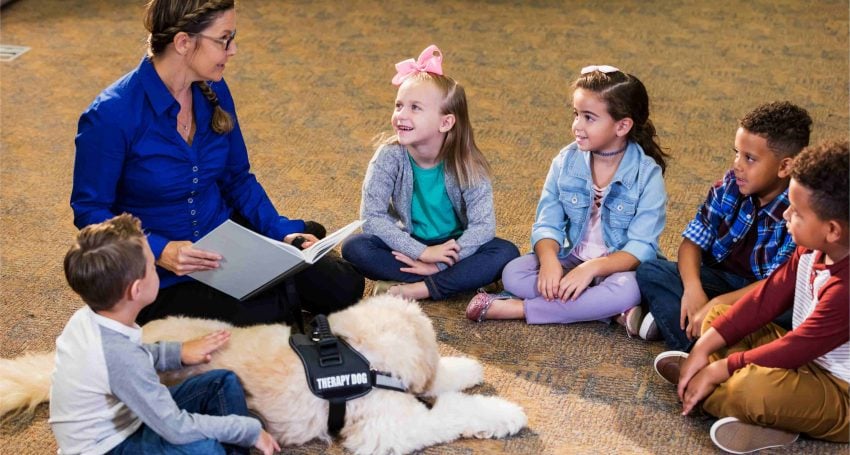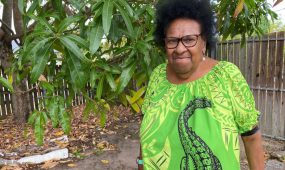Welcoming and including autistic people in our churches
Resources & Research
Two Australian Anglicans – a young woman with autism and the parent of a child with autism – share their stories of inclusion and respect in parishes: “The overwhelming impression I got was that the parish community members were there for the common good rather than for their individual needs. As a result of their experience, both my primary-aged children understand church and want to go to church”

Ava – Young autistic parishioner*
I am a young healthcare professional who uses an assistance dog to help navigate my disabilities, which include autism, postural orthostatic tachycardia syndrome (POTs), Ehlers Danlos Syndrome and post-traumatic stress disorder.
In my parish, I assist with a number of lay leadership roles. My church community generally has a welcoming and inclusive culture. However, I am regularly frustrated by the behaviour of many parishioners when they ignore my reasonable requests.
Advertisement
My assistance dog wears a blue vest with “Assistance Dog” written clearly on it. He helps me by alerting me when my heart rate escalates, when I become anxious and by positioning himself between me and others to enable the space I need as an autistic person. Nearly every time I attend church activities, including services, Bible studies, meetings and morning teas, I am asked by parishioners if they can pat my dog. When I say “no” politely and explain that he is working and that patting him will distract him, around half the time parishioners pat him anyway.
I find this so frustrating, annoying and upsetting. This behaviour also sometimes triggers my anxiety.
In my experience, this tends to be an issue with older parishioners. I am young and I also don’t “look” like I need an assistance dog. Because of these factors I think older parishioners are more inclined to dismiss me.
My parish priest is very supportive and has spoken to the congregation during the notices several times about this issue. Fellow parishioners also step in sometimes when my dog is patted to politely call them out.
If I am having a bad day with my health, I avoid going to services and other church activities because I know I won’t cope with people patting my assistance dog when I have asked them not to. This behaviour also makes me avoid certain people during fellowship times, in the foyer of the church and in the car park, which is disappointing.
Rosa – Parishioner and mother of a child with a disability*
When I was young, my grandmother took me to an Anglican church. I came back to the Church in my 20s and quickly became engaged in lay leadership. I have a healthcare background.
Before my sons started school, we moved house and consequently shifted from a large parish well-equipped for young families to a small parish with no children and no allocated kids’ play area or Sunday School.
Prior to our first service in the new parish, the priest organised activity bags for my kids. By our second service, a pew had been moved to create space for a play area, with foam mats, books, crayons, puppets and quiet toys. As one of my sons has autism, he would lie under a pew during services to limit the sensory exposure. Parishioners would pass him a cushion for his head and then “pass the peace” to him by bending down and greeting him with a smile. Sometimes he would commando crawl under the pews to the sanctuary to receive communion, which worried me at first. However, the parishioners were unperturbed and assured me that they would just move their feet to create space for him.
Advertisement
For the first time in a church, I felt that my family was completely included, accepted and valued just as we are and that we didn’t have to be anything else. We are in a different church now due to a career shift.
The small welcoming congregation, the calm pragmatism of the parish priest, and the whole community’s willingness to be flexible with the space and their practices helped us feel included. The overwhelming impression I got was that the parish community members were there for the common good rather than for their individual needs.
As a result of their experience, both my primary-aged children understand church and want to go to church. My son often says, “I miss that church and being under the pews.”
* Pseudonyms used to protect anonymity. The terms and descriptors used are those preferred by the storytellers.
Editor’s note: These two stories are sourced from a new small group resource that is available for parishes and ministries to explore inclusion and respect. The free resource covers eight optional themes, with a choice of personal stories from Australian Anglicans forming the resource’s backbone. This resource was developed by the Parishes and other Mission Agencies Commission (PMC) team in 2022 and is part of the ACSQ’s response to General Synod’s ‘Being Together’ statement. The resource may be downloaded from the ACSQ website.





